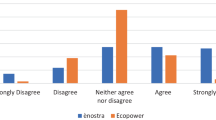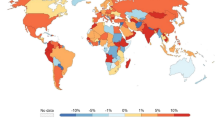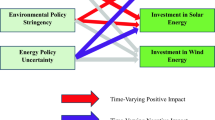Abstract
The World Economic Forum (2018) has introduced a comprehensive proxy for the Energy Transition Index (ETI), which includes two main sub-indices; the energy System Performance Index (SPI) and Transition Readiness (TRI). The first sub-index measures the current state of the energy system, and the latter indicates future transition(s). Any factor that can move these two levers in a positive direction will eventually lead to improved energy transitions. Various factors affect the energy transition. Since the ETI is a comprehensive index that includes socio-economic, governance structures, and political dimensions of the energy transition, it is expected to be impacted by globalization and economic complexity. The present study seeks to answer whether the impact of globalization and economic complexity on both energy transition sub-indicators is in the same direction. Also, do the effects of these two variables vary at different levels of energy transition and its sub-indices? For this purpose, we implement a fixed-effect panel threshold model for data from the European Union. The results demonstrate that (overall) globalization significantly influences the ETI and its sub-indices at all levels. The economic complexity in all three regimes reduces TRI (at 90% or 95% confidence intervals). Nevertheless, it harms the SPI and ETI if they exceed the threshold.

Source: United Nations, Energy Statistics

Source: United Nations, Energy Statistics

Source: International Energy Agency (IEA)




Source: research finding

Source: research finding

Source: research finding
Similar content being viewed by others
Data availability
The datasets used and/or analyzed during the current study are available from the corresponding author on reasonable request.
Notes
The economic, social, and political dimensions are different dimensions of globalization. Economic globalization usually is measured by trade openness (Samadi 2019). Social globalization is measured as the spread of peoples, images, information, and ideas. Political globalization is thus measured as the diffusion of government policies (Asongu and Biekpe 2018). The KOF Globalization Index is a composite index measuring globalization along the economic, social, and political dimensions.
The vertical axis unit is the petajoules.
How to calculate these indicators is explained in “Data.”.
The fixed-effect panel threshold method is used in this research, although, in this methodology, there are appropriate tests for pre-estimation and it is possible to make sure whether the model is linear or not, and the number of thresholds is determined, but the limitation and weakness of this methodology are in the post-estimation tests, which do not report goodness-of-fit statistics.
Besides that, the World Economic Forum index has not been calculated for some countries, including Cyprus, the Czech Republic, Estonia, and Latvia.
References
Acheampong AO, Adams S, Boateng E (2019) Do globalization and renewable energy contribute to carbon emissions mitigation in Sub-Saharan Africa? Sci Total Environ 677:436–446
Adebayo TS, Acheampong AO (2022) Modelling the globalization-CO2 emission nexus in Australia: evidence from quantile-on-quantile approach. Environ Sci Pollut Res 29(7):9867–9882
Ahmed Z, Wang Z, Mahmood F, Hafeez M, Ali N (2019) Does globalization increase the ecological footprint? Empirical evidence from Malaysia. Environ Sci Pollut Res 26(18):18565–18582
Arslan HM, Khan I, Latif MI, Komal B, Chen S (2022) Understanding the dynamics of natural resources rents, environmental sustainability, and sustainable economic growth: new insights from China. Environ Sci Pollut Res 1–16
Asongu SA, Biekpe N (2018) Globalization and terror in Africa. Int Econ 156:86–97
Azam W, Khan I, Ali SA (2022) Alternative energy and natural resources in determining environmental sustainability: a look at the role of government final consumption expenditures in France. Environ Sci Pollut Res 1–17
Beck T, Levine R (2004) Stock markets, banks and growth: panel evidence. J Bank Finance 28:423–442
Bilgili F, Ulucak R, Koçak E, İlkay SÇ (2020) Does globalization matter for environmental sustainability? Empirical investigation for Turkey by Markov regime-switching models. Environ Sci Pollut Res 27(1):1087–1100
Can M, Gozgor G (2017) The impact of economic complexity on carbon emissions: evidence from France. Environ Sci Pollut Res 24(19):16364–16370
Destek MA (2020) Investigation on the role of economic, social, and political globalization on the environment: evidence from CEECs. Environ Sci Pollut Res 27(27):33601–33614
Edenhofer O, Pichs-Madruga R, Sokona Y, Seyboth K, Kadner S, Zwickel T, Matschoss P (eds) (2011) Renewable energy sources and climate change mitigation: Special report of the intergovernmental panel on climate change. Cambridge University Press
Hadri K, Rao Y (2008) Panel stationarity test with structural breaks. Oxford Bull Econ Stat 70(2):245–269
Hansen BE (1999) Threshold effects in non-dynamic panels: Estimation, testing, and inference. J Econom 93(2):345–368
Haseeb A, Xia E, Baloch MA, Abbas K (2018) Financial development, globalization, and CO 2 emission in the presence of EKC: evidence from BRICS countries. Environ Sci Pollut Res 25(31):31283–31296
Hidalgo CA, Hausmann R (2009) The building blocks of economic complexity. Proceedings of the National Academy of Sciences 106(26):10570–10575
Khan I, Hou F (2021) The impact of socio-economic and environmental sustainability on CO2 emissions: a novel framework for thirty IEA countries. Soc Indic Res 155(3):1045–1076
Khan D, Ullah A (2019) Testing the relationship between globalization and carbon dioxide emissions in Pakistan: does environmental Kuznets curve exist? Environ Sci Pollut Res 26(15):15194–15208
Khan I, Hou F, Zakari A, Tawiah VK (2021) The dynamic links among energy transitions, energy consumption, and sustainable economic growth: a novel framework for IEA countries. Energy 222:119935
Khan I, Tan D, Hassan ST (2022a) Role of alternative and nuclear energy in stimulating environmental sustainability: impact of government expenditures. Environ Sci Pollut Res 29(25):37894–37905
Khan I, Zakari A, Dagar V, Singh S (2022b) World energy trilemma and transformative energy developments as determinants of economic growth amid environmental sustainability. Energy Economics 108:105884
Khan I, Zakari A, Ahmad M, Irfan M, Hou F (2022c) Linking energy transitions, energy consumption, and environmental sustainability in OECD countries. Gondwana Res 103:445–457
Kuc-Czarnecka ME, Olczyk M, Zinecker M (2021) Improvements and spatial dependencies in energy transition measures. Energies 14(13):3802
Kuriqi A, Pinheiro AN, Sordo-Ward A, Garrote L (2019) Influence of hydrologically based environmental flow methods on flow alteration and energy production in a run-of-river hydropower plant. J Clean Prod 232:1028–1042
Kuriqi A, Pinheiro AN, Sordo-Ward A, Garrote L (2020) Water-energy-ecosystem nexus: Balancing competing interests at a run-of-river hydropower plant coupling a hydrologic–ecohydraulic approach. Energy Convers Manage 223:113267
Kuriqi A, Pinheiro AN, Sordo-Ward A, Bejarano MD, Garrote L (2021) Ecological impacts of run-of-river hydropower plants—current status and future prospects on the brink of energy transition. Renew Sustain Energy Rev 142:110833
Kuriqi A, Jurasz J (2022) Small hydropower plants proliferation and fluvial ecosystem conservation nexus. In: Complementarity of variable renewable energy sources. Academic Press, pp 503–527
Lee KH, Min B (2014) Globalization and carbon constrained global economy: a fad or a trend? J Asia Pac Bus 15(2):105–121
Liu M, Ren X, Cheng C, Wang Z (2020) The role of globalization in CO2 emissions: a semi-parametric panel data analysis for G7. Sci Total Environ 718:137379
Liu H, Liang S, Cui Q (2021) The nexus between economic complexity and energy consumption under the context of sustainable environment: evidence from the LMC countries. Int J Environ Res Public Health 18(1):124
Liu H, Saleem MM, Al-Faryan MAS, Khan I, Zafar MW (2022a) Impact of governance and globalization on natural resources volatility: the role of financial development in the Middle East North Africa countries. Resour Policy 78:102881
Liu H, Alharthi M, Atil A, Zafar MW, Khan I (2022b) A non-linear analysis of the impacts of natural resources and education on environmental quality: green energy and its role in the future. Resour Policy 79:102940
Lu J, Nemet GF (2020) Evidence map: topics, trends, and policy in the energy transitions literature. Environ Res Lett 15(12):123003
Lv Z, Xu T (2018) Is economic globalization good or bad for the environmental quality? New evidence from dynamic heterogeneous panel models. Technol Forecast Soc Chang 137:340–343
Malka L, Daci A, Kuriqi A, Bartocci P, Rrapaj E (2022) Energy storage benefits assessment using multiple-choice criteria: the case of Drini River Cascade, Albania. Energies 15(11):4032
Neagu O, Teodoru MC (2019) The relationship between economic complexity, energy consumption structure and greenhouse gas emission: heterogeneous panel evidence from the EU countries. Sustainability 11(2):497
Pata UK (2021) Renewable and non-renewable energy consumption, economic complexity, CO 2 emissions, and ecological footprint in the USA: testing the EKC hypothesis with a structural break. Environ Sci Pollut Res 28(1):846–861
Pesaran MH (2004) General diagnostic tests for cross-section dependence in panels, working paper. Trinity College, Cambridge
Rafindadi AA, Usman O (2019) Globalization, energy use, and environmental degradation in South Africa: startling empirical evidence from the Maki-cointegration test. J Environ Manage 244:265–275
Rafique MZ, Doğan B, Husain S, Huang S, Shahzad U (2021) Role of economic complexity to induce renewable energy: contextual evidence from G7 and E7 countries. Int J Green Energy 18(7):745–754
Rahman ShU, Chen S, Saud S, Bano S, Haseeb A (2019) The nexus between financial development, globalization, and environmental degradation: fresh evidence from Central and Eastern European Countries. Environ Sci Pollut Res 26(24):24733–24747
Rasoulinezhad E, Taghizadeh-Hesary F, Sung J, Panthamit N (2020) Geopolitical risk and energy transition in Russia: evidence from ARDL bounds testing method. Sustainability 12(7):2689
Ren X, Cheng C, Wang Z, Yan C (2021) Spillover and dynamic effects of energy transition and economic growth on carbon dioxide emissions for the European Union: a dynamic spatial panel model. Sustain Dev 29(1):228–242
Saint Akadiri S, Alola AA, Olasehinde-Williams G, Etokakpan MU (2020) The role of electricity consumption, globalization and economic growth in carbon dioxide emissions and its implications for environmental sustainability targets. Sci Total Environ 708:134653
Salahuddin M, Ali M, Vink N, Gow J (2019) The effects of urbanization and globalization on CO2 emissions: evidence from the Sub-Saharan Africa (SSA) countries. Environ Sci Pollut Res 26(3):2699–2709
Samadi AH (2019) Institutional quality and globalization in developing countries. In: Globalization and development. Springer, Cham, pp 135–161
Saud S, Baloch MA, Lodhi RN (2018) The nexus between energy consumption and financial development: estimating the role of globalization in Next-11 countries. Environ Sci Pollut Res 25(19):18651–18661
Saud S, Chen S, Haseeb A (2020) The role of financial development and globalization in the environment: accounting ecological footprint indicators for selected one-belt-one-road initiative countries. J Clean Prod 250:119518
Shahbaz M, Ozturk I, Afza T, Ali A (2013) Revisiting the environmental Kuznets curve in a global economy. Renew Sustain Energy Rev 25:494–502
Shahbaz M, Khan S, Ali A, Bhattacharya M (2017) The impact of globalization on CO2 emissions in China. Singapore Econ Rev 62(04):929–957
Shahbaz M, Shahzad SJH, Mahalik MK, Sadorsky P (2018) How strong is the causal relationship between globalization and energy consumption in developed economies? A country-specific time-series and panel analysis. Appl Econ 50(13):1479–1494
Singh HV, Bocca R, Gomez P, Dahlke S, Bazilian M (2019) The energy transitions index: an analytic framework for understanding the evolving global energy system. Energ Strat Rev 26:100382
Taghizadeh-Hesary F, Rasoulinezhad E (2021) Analyzing energy transition patterns in Asia: evidence from countries with different income levels. Energy Market and Energy Transition: Dynamics and Prospects
Taghizadeh-Hesary F, Rasoulinezhad E, Shahbaz M, Vo XV (2021) How energy transition and power consumption are related in Asian economies with different income levels? Energy 121595
Taghizadeh-Hesary F, Zakari A, Yoshino N, Khan I (2022) Leveraging on energy security to alleviate poverty in Asian economies. Singapore Econ Rev 1–28
Twerefou DK, Danso-Mensah K, Bokpin GA (2017) The environmental effects of economic growth and globalization in Sub-Saharan Africa: a panel general method of moments approach. Res Int Bus Financ 42:939–949
Wang Z, Rasool Y, Asghar MM, Wang B (2019) Dynamic linkages among CO 2 emissions, human development, financial development, and globalization: empirical evidence based on PMG long-run panel estimation. Environ Sci Pollut Res 26(36):36248–36263
You W, Lv Z (2018) Spillover effects of economic globalization on CO2 emissions: a spatial panel approach. Energy Economics 73:248–257
Zahoor Z, Latif MI, Khan I, Hou F (2022) Abundance of natural resources and environmental sustainability: the roles of manufacturing value-added, urbanization, and permanent cropland. Environ Sci Pollut Res 1–14
Zakari A, Tawiah V, Khan I, Alvarado R, Li G (2022) Ensuring sustainable consumption and production pattern in Africa: evidence from green energy perspectives. Energy Policy 169:113183
Zhang Y, Khan I, Zafar MW (2022) Assessing environmental quality through natural resources, energy resources, and tax revenues. Environ Sci Pollut Res 1–16
Author information
Authors and Affiliations
Contributions
Conceptualization by Ali Hussein Samadi; methodology by Sakine Owjimehr; formal analysis by all authors; resources by Sakine Owjimehr; writing—original draft preparation by Sakine Owjimehr; writing—review and editing by Ali Hussein Samadi. All authors have read and agreed to the published version of the manuscript.
Corresponding author
Ethics declarations
Ethics approval
No ethical issue is to be declared in this article.
Consent to participate
No consent of participation is to be claimed.
Consent for publication
All of the authors have read and approved the paper for publication.
Competing interests
The authors declare no competing interests.
Additional information
Responsible Editor: Ilhan Ozturk
Publisher's note
Springer Nature remains neutral with regard to jurisdictional claims in published maps and institutional affiliations.
Highlights
• Globalization has a significant positive impact on the energy transition and its two sub-indicators in the EU.
• By improving energy transition and its two sub-indicators, the impact of globalization would increase in the EU.
• The economic complexity reduces transition readiness at all levels in the EU.
• The economic complexity in the early system performance levels helps improve it in the EU.
• Economic complexity gets impaired at high energy transition levels and system performance levels in the EU.
Rights and permissions
Springer Nature or its licensor (e.g. a society or other partner) holds exclusive rights to this article under a publishing agreement with the author(s) or other rightsholder(s); author self-archiving of the accepted manuscript version of this article is solely governed by the terms of such publishing agreement and applicable law.
About this article
Cite this article
Owjimehr, S., Samadi, A.H. Energy transition determinants in the European Union: threshold effects. Environ Sci Pollut Res 30, 22159–22175 (2023). https://doi.org/10.1007/s11356-022-23743-w
Received:
Accepted:
Published:
Issue Date:
DOI: https://doi.org/10.1007/s11356-022-23743-w





